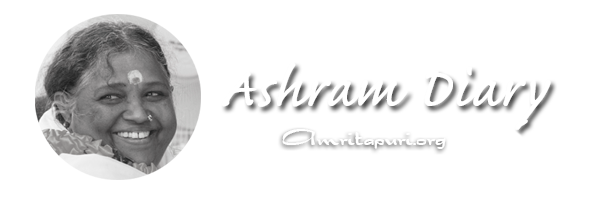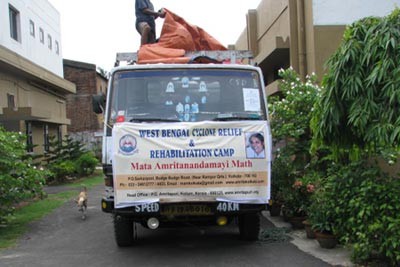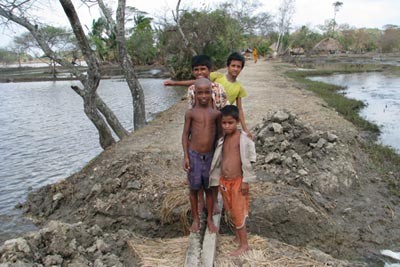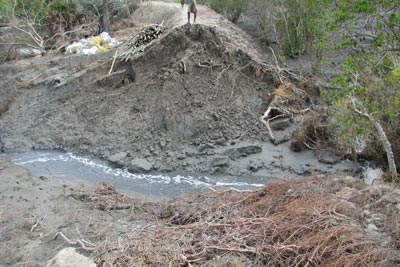Bengal Cylone Releif 2009
Preparations and the first day at the camp
30th May 2009
The day (26th May 2009) dawned as usual with rain bringing great relief for the people of Calcutta, who were roasted under the scorching heat for nearly a month. The people were set to their daily routine. Suddenly at about 10’0 clock, strong wind started blowing with a speed of about 120 Kmph. The sudden emergence of strong Cyclonic storm, brought the normal communing system and the public transport system to a grinding halt. Almost all the roads were blocked with uprooted trees. The cyclone named AILA left a trail of death and destruction.
Because of power outages several several trains were delayed. The airport suspended the flights for several hours. The restoration of power supply to several parts of the city took nearly 3 days. People had to suffer without electricity and water for 3 days. Attendance in the private and govt offices were very thin and even 24X7 IT companies declared holiday.
Although the cyclone did not ‘hit’ the city of Kolkata, in the full sense of the term, the peripheral or outer spiraling winds of AILA began lashing the city since morning at speeds greater than 250 kmphs per hour. The size of the cyclonic storm was so large -swelling to a maximum diameter of 250-300 Kms- that when the core crossed the coast, the city was already reeling under its winds. Had Aila ripped Calcutta in its full fury the damage to life and property would have been unimaginable. This cyclone is said to be one of the worst after the Great Calcutta cyclone of 1864 which killed 60,000 peole.
Though Cyclone Aila narrowly missed Calcutta it lashed South 24-Parganas, North 24-Parganas, East Midnapore, Howrah and parts of Hooghly. Aila made its land fall near Sagar Island around 2 PM with a wind speed of 120 Kmph. After we were intimated of the need for medical and food assistance by the concerned authorities from the govt we started planning for the relief work.
Following the cyclone, the MAM Kolkata Centre immediately rallied into action. Since Amma was on her world tour enroute from Japan to USA , we took sometime to contact her and seek her guidance, as to how the relief work had to be carried out. Amma soon conveyed that we organize a local group of devotees and arrange to provide cooked food and medical facilities to cyclone affected people of West Bengal.
On contacting the AIMS Super Speciality Hospital at Cochin, two senior specialist Doctors in emergency medicine, Dr. GT Phani Krishna and Dr. G Tanuja were rushed to Kolkata.
After discussing with the District Authorities of South 24- Parganas, we were advised to visit some badly affected areas in the remote parts of the district. We soon organized ourselves and purchased several tonnes of provisions, dozen of cans of mineral water and cloths, cooking vessels, gas and stove, children’s food, gen-set and other such items that would be needed in calamity struck areas, which we knew would be needed from our past experiences.
Around 9 am, the truck had left with the supplies alongwith several Yuva Dharma Dhara volunteers from Durgapur to Maipith Naginabha in Kultoli Anchal off Baruipur, 24 Parganas Dt (South).
This village is one of the many in a group of Islands near the World’s Largest Delta Forest ‘The Sunderban’, which is also famous for the Sunderban Royal Bengal Tiger Reserve. Many of you may have read in the papers about the frequent incidents of these tiger straying into the nearby villages and killing domestic cattle. Every year there are at least a dozen incidents of tigers and leopards killing children for food. The reason behind this forest officials say is that these tigers when they get old are no longer able to chase and hunt fast moving animals and so visit villages looking for easy meat…. may be that is how the useage ‘easy meat’ has originated.
We started with a team of about a dozen devotees from Kolkata, some of whom were initially apprehensive about doing relief work in such remote places but they love for Amma and the emphasis that she laid on service motivated them enough to rise upto the challenge.
Travelling through congested and winding roads we crossed the river Petkulchand and reached the centre of the island in Maipith around 7 pm. 100’s of villages enroute did not have a semblance of electricity and the whole area was in darkness. Those who could afford had solar panels with lights fitted in their homes and shops. On arriving there we were told that we could not take the trucks and cars any further as the roads were very narrow, and which we were soon to find out. We hired several small contraptions (motorized trolleys) and unloaded all the materials from the truck onto them. As we moved deeper towards our destination village we found that the so called roads were just two layers of bricks placed one on top of the other, and because of heavy rains the same had loosened and got damaged in many places.
We reached our destination Naginabad village around 11PM tired and hungry. After lighting a few candles, we got the genset working, cooked a simple meal and had dinner.
We were accommodated in 2 rooms in a single storied incomplete school building. One room was used as a store and kitchen and the other served a a pharmacy, doctors consultation and also doubled up as the doctors bedroom at night, since they were a married couple. The rest of us slept in the open.
– Sadasiva Chaitanya





Leave a Reply
You must be logged in to post a comment.